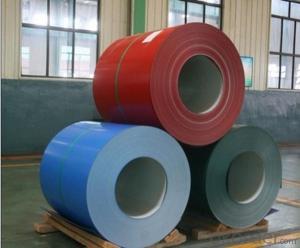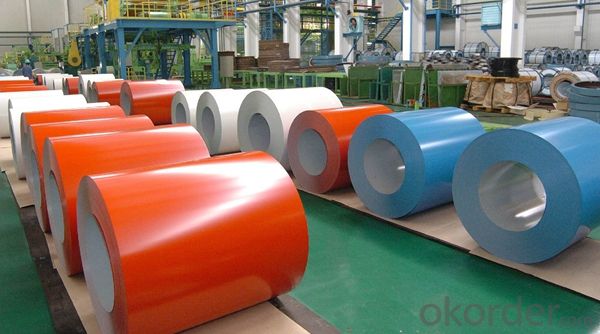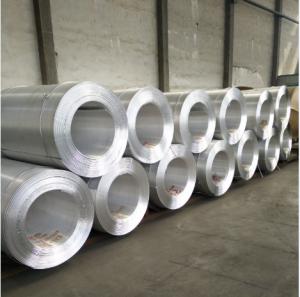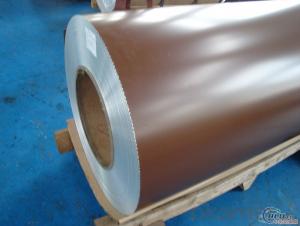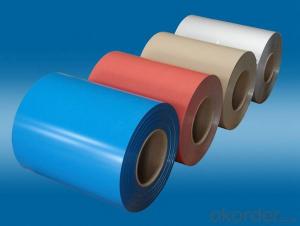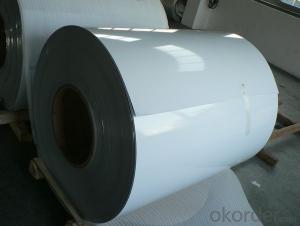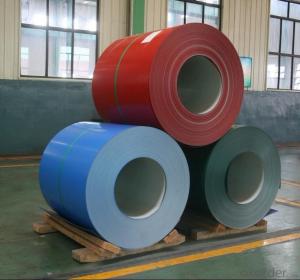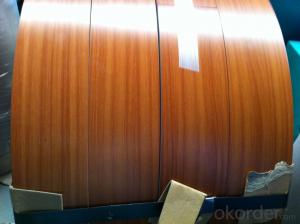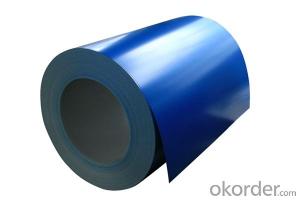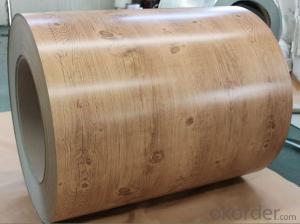Small Aluminum Coils for Outdoor Wall System - Color Coated
- Loading Port:
- Shanghai
- Payment Terms:
- TT OR LC
- Min Order Qty:
- 5 m.t.
- Supply Capability:
- 10000 m.t./month
OKorder Service Pledge
OKorder Financial Service
You Might Also Like
Specification
1. Specification of Color Coated Aluminum Coil for Out Door Wall System
characteristics | Application |
1) Super peeling strength | 1) Building exterior curtain walls |
2) Excellent surface flatness and smoothness | 2) Decoration and renovation additions for old buildings |
3) Superior weather, corrosion, pollutant resistance | 3) Decoration of interior walls, ceilings, bathrooms, kitchens and balconies |
4) Even coating, various colors | 4) Shop door decorations |
5) Fireproof, excellent heat and sound insulation | 5) Advertisement board display platforms and signboards |
6) Superior impact resistance | 6) Wallboards and ceilings for tunnels |
7) Lightweight and easy to process | 7) Industrial materials, materials for vehicles and boats |
2. Application of Color Coated Aluminum Coil for Out Door Wall System
(1).Interior: wall cladding, ceilings, bathrooms, kitchens and balconies, shutters, doors...
(2).Exterior: wall cladding, facades, roofing, canopies, tunnels,column covers , renovations...
(3).Advertisement: display platforms, signboards, fascia, shop fronts...
3. Feature of Color Coated Aluminum Coil for Out Door Wall System
*Such coil is specially designed to replace aluminum ingot, due to the high export tax of aluminum ingot, the coil has better price than ingot.
*This type of coil can fit customer's remelting furnace just like ingot, no need to make any change to the production line that was previously used for ingot. The standard coil size and weight is very suitable for the feed gate of furnace.
*This type of coil causes less material wastage than ingot when remelted.
*Our coil is made directly from ore, no need to go though the ingot making process, quality is much better than other suppliers who use ingot scrap to make coil.
Be free from Oil Stain, Dent, Inclusion, Scratches, Stain, Oxide Dicoloration, Breaks, Corrosion, Roll Marks, Dirt Streaks and other defect which will interfere with use
4. Certificate:
SGS and ROHS(if client request, paid by client), MTC(plant provided), Certificate of Origin(FORM A, FORM E, CO), Bureau Veritas and SGS (if client request, paid by client), CIQS certificate
5. Image of Color Coated Aluminum Coil for Out Door Wall System
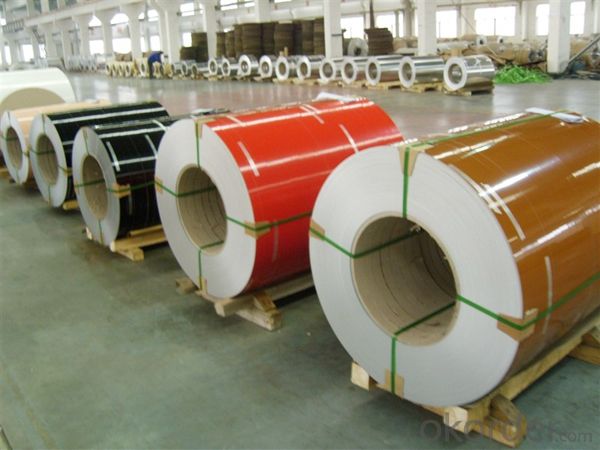
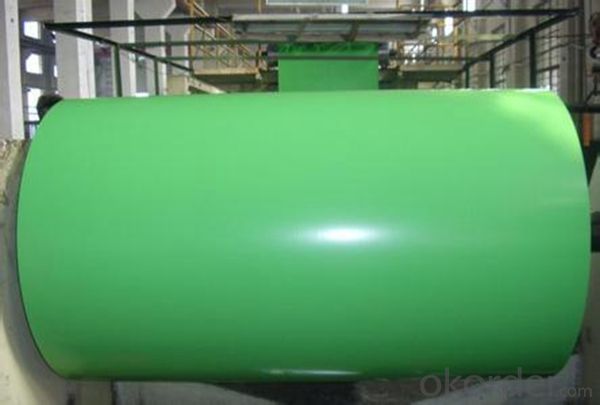
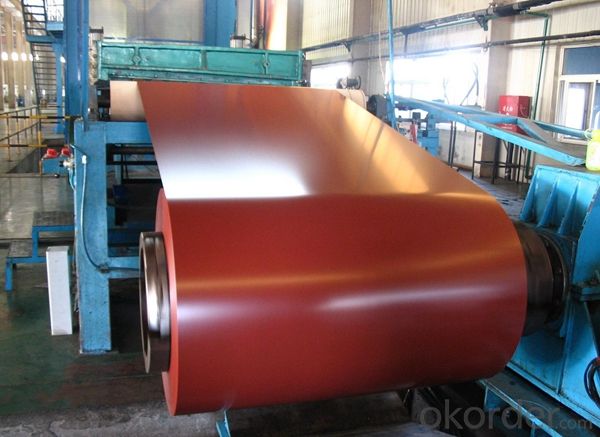
6. Package and shipping of Color Coated Aluminum Coil for Out Door Wall System
eye to wall
eye to the wall
with wood pallet (wooded case also available)
7. FAQ
1) What is the delivery time?
Dpends on actual order, around 20 to 35 days
2)What is the QC system:
We have QC staff of 20 persons and advanced equipment, each production is with MTC traced from Aluminum ingot lot.
3) What market do you mainly sell to?
Australia, America, Asia, Middle East, Western Europe, Africa etc
- Q: Can aluminum coils be used in low-friction applications?
- Yes, aluminum coils can be used in low-friction applications. Aluminum's low coefficient of friction and excellent thermal conductivity make it a suitable material for various applications where low friction is desired, such as in sliding mechanisms, bearings, and electrical connectors.
- Q: i used hf acid to clean the rails on my trailer and it left black streaks on the alluminum... uld it be the type of aluminum alloy???
- Aluminum will oxidize. Not like steel though, that forms the red orange rust (iron oxide) that will eventually eat through thin steel. When aluminum oxidizes, it leaves a thin cloudy film on the surface. That's why nice new shiny diamond plate gets dull after being exposed for some time. It can be removed by some chemicals, apparently your hf acid. When the acid breaks down the cloudy oxidize layer, it may turn into a black residue. You'll be left with a clean aluminum surface that will, over time, oxidize and get that cloudy film again. It could also be waste compound of your hf acid etching the surface. Check to see whether the acid you're using will etch or clean an aluminum surface.
- Q: Are aluminum coils suitable for automotive heat shields?
- Yes, aluminum coils are suitable for automotive heat shields. Aluminum is a widely used material in the automotive industry due to its excellent heat resistance and thermal conductivity properties. It is lightweight and has a high strength-to-weight ratio, making it an ideal choice for heat shields. Aluminum coils can effectively dissipate heat and protect sensitive components from excessive heat exposure. Additionally, aluminum is corrosion-resistant, which is crucial for automotive applications where heat shields are exposed to various environmental conditions. Overall, aluminum coils offer the necessary properties and performance required for automotive heat shields.
- Q: Can aluminum coils be used in marine or saltwater environments?
- Indeed, marine or saltwater environments allow for the utilization of aluminum coils. The exceptional corrosion resistance of aluminum renders it a fitting material for a multitude of marine applications. The naturally occurring oxide layer on the exterior of aluminum acts as a shield against saltwater and other corrosive substances. This layer can be further fortified via procedures such as anodizing or painting, thereby augmenting its ability to resist corrosion. Furthermore, the lightweight nature of aluminum coils confers an advantage in marine applications where the reduction of weight is sought after. On the whole, the corrosion resistance and lightweight characteristics of aluminum coils render them a favored option in marine and saltwater environments.
- Q: I'm doing a project on aluminum and this is the one thing i can't find. Also will it rust, tarnish or corrode?
- Aluminum is not explosive, although in the presence of a suitable oxidizing agent it can burn. It does not rust (that concept applies only to ferrous metals), but can corrode and will tarnish rapidly if a cut surface is exposed to air. The tarnish, aluminum oxide, protects the surface from further oxidation, and a process called anodizing puts a heavy oxide layer on the surface for improved protection. Aluminum is produced by electrolysis from aluminum oxide, which is dissolved in molten aluminum fluoride; a typical electrolytic pot uses a current of 5 volts at 105,000 amperes and will produce a ton of aluminum per day.
- Q: Can aluminum coils be used for cladding purposes?
- Yes, aluminum coils can be used for cladding purposes. Aluminum is a popular choice for cladding due to its durability, lightweight nature, and resistance to corrosion. The coils can be formed into various shapes and sizes, making them suitable for cladding applications in industries such as construction, architecture, and manufacturing.
- Q: Can aluminum coils be used in the production of sporting goods?
- Sporting goods production can involve the use of aluminum coils, a lightweight and durable material commonly found in the manufacturing of baseball bats, tennis rackets, golf clubs, and bicycles. These coils are often employed as a raw material during the production process, helping to shape and structure the final sporting goods. The utilization of aluminum in sporting goods provides several benefits, including improved performance, increased durability, and enhanced weight distribution. Furthermore, aluminum's resistance to corrosion makes it an excellent choice for outdoor sporting activities. Ultimately, the versatility, strength, and performance-enhancing capabilities of aluminum coils contribute to their widespread use in the production of sporting goods.
- Q: What are the maximum and minimum coil weights available?
- The specific type of coil being referred to can cause variations in the available maximum and minimum coil weights. When considering electrical coils, such as those utilized in transformers or motors, factors like wire size, material, number of turns, and intended application determine the maximum and minimum coil weights. Manufacturers generally set weight limits on these coils, which can range from small and lightweight to large and heavy. For instance, a small coil may have a maximum weight of a few grams, while a larger coil could weigh several kilograms. To ascertain the maximum and minimum coil weights for a specific application, it is essential to consult the manufacturer or supplier's specifications.
- Q: How are aluminum coils used in the production of food processing equipment?
- Aluminum coils are commonly used in the production of food processing equipment due to their excellent thermal conductivity, corrosion resistance, and lightweight nature. These coils are often formed into various shapes and sizes to create components like heat exchangers, evaporators, and condensers that help regulate temperature during food processing. Additionally, aluminum coils can be easily cleaned and sanitized, making them ideal for use in the food industry where hygiene is crucial.
- Q: Are aluminum coils suitable for electrical conductivity applications?
- Yes, aluminum coils are suitable for electrical conductivity applications. Aluminum is a good conductor of electricity, second only to copper in terms of conductivity. It is widely used in various electrical applications, including power transmission lines, electrical wiring, and electronic devices. Aluminum coils offer efficient electrical conductivity while being lightweight, cost-effective, and resistant to corrosion.
Send your message to us
Small Aluminum Coils for Outdoor Wall System - Color Coated
- Loading Port:
- Shanghai
- Payment Terms:
- TT OR LC
- Min Order Qty:
- 5 m.t.
- Supply Capability:
- 10000 m.t./month
OKorder Service Pledge
OKorder Financial Service
Similar products
Hot products
Hot Searches
Related keywords
